
The Paris Institute of Political Studies is a public research university located in Paris, France that holds the status of grande école and grand établissement. The institute maintains additional campuses in Dijon, Le Havre, Menton, Nancy, Poitiers and Reims, and is known primarily for its academic offerings and research in political science, history, economics, law and sociology.
Instituts d'études politiques, or IEPs, are ten publicly owned institutions of higher learning in France. They are located in Aix-en-Provence, Bordeaux, Grenoble, Lille, Lyon, Paris, Rennes, Strasbourg and Toulouse, and since 2014 Saint-Germain-en-Laye. Their vocation is the study and research of contemporary political science. All students at the IEPs study a curriculum that is highly practical and broadbased, focusing on the full range of the social sciences across law, economics, finance, and management. These schools are considered as some of the most selective in France, mainly because they are the place where many political and business leaders are trained.
The Institut d'Études politiques de Lyon also known as Sciences Po Lyon, is a grande école located in Lyon, France. It is one of ten Institutes of Political Studies in France, and was established in 1948 by Charles de Gaulle's provisional government following the model of the École Libre des Sciences Politiques. It is located at the Centre Berthelot within the buildings of a former military health college and operates as an autonomous institution within the University of Lyon. It is the first Institute of Political Studies to have joined the prestigious Conférence des Grandes écoles.
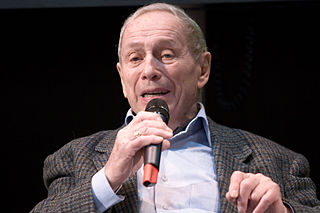
Georges Balandier was a French sociologist, anthropologist and ethnologist noted for his research in Sub-Saharan Africa. Balandier was born in Aillevillers-et-Lyaumont. He was a professor at the Sorbonne, and is a member of the Center for African Studies, a research center of the École pratique des hautes études. He held for many years the Editorship of Cahiers Internationaux de Sociologie and edited the series Sociologie d'Aujourd'hui at Presses Universitaires de France. He was elected to the American Philosophical Society in 1976. He died on 5 October 2016 at the age of 95.
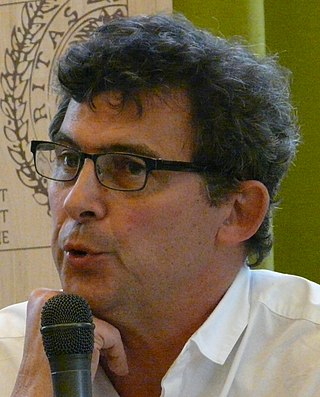
Éric Fassin is a French sociologist.
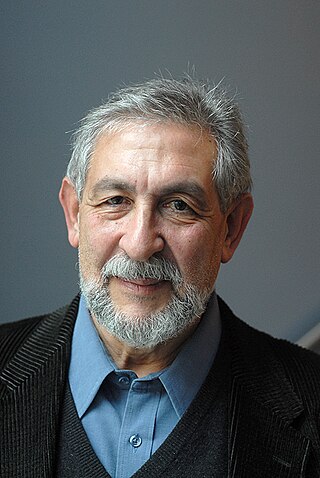
Daniel Dayan is a French social scientist born in 1943. A fellow of the Marcel Mauss Institute at Ecole des Hautes Etudes en Sciences Sociales, and of the Levinas European Institute, Dayan has been Director of Research in Sociology, at Centre National de la Recherche Scientifique, professor of Media Theory at the Institut d'Etudes Politiques Paris and a Hans Speier Visiting Professor at the New school for Social Research.
Josepha Laroche is a French professor of political science, specializing in international relations. She is professor at the University of Paris 1 Pantheon-Sorbonne, where she is Director of the master's program of research in international relations, and is also researcher at the UMR 201 Développement et sociétés. She was also Institut d'Études Politiques de Paris from 2004 to 2009.
Danielle Bleitrach is a French sociologist and journalist. From the 1970s through the end of the century, she was CNRS researcher and lecturer at the Aix-Marseille University, focusing on the sociology of the working class and urbanization. From 1981 to 1996 she was a member of the Central Committee of the Communist Party of France, then the National Committee of the Party. She was also assistant editor-in-chief of the party weekly Révolution. She has contributed to La Pensée, Les Temps Modernes and Le Monde Diplomatique. In the 2000s and 2010s, after retiring from teaching, she co-authored texts on Cuba, Nazism and Ukraine.

Emmanuel Roberto Goffi is a French philosopher of technologies and, more specifically, an artificial intelligence ethicist. He has served in the French Air Force for 27 years. He is the co-founder and co-director of the Global AI Ethics Institute in Paris. He is also an instructor and research associate with the Frankfurt Big Data Lab at the Goethe University Frankfurt in Germany and a research fellow with the Centre for Defence and Security Studies at the University of Manitoba, Winnipeg, Manitoba in Canada. After having worked on military ethics, and more precisely on ethics applied to Lethal autonomous weapon, his focus has turned to ethics applied to Artificial intelligence.
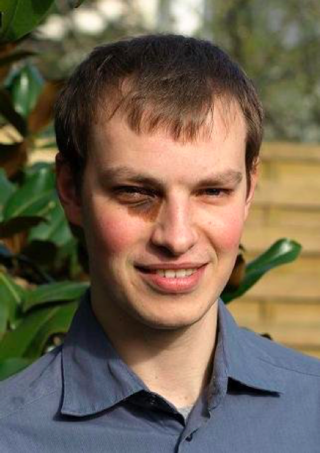
Geoffrey Pleyers is an F.R.S.–FNRS researcher and professor of sociology at Université Catholique de Louvain, Belgium., and a researcher at the Collège d'Etudes Mondiales (Paris) where he chairs the program "Social Movements in the Global Age". He is the author of the book "Alter-Globalization. Becoming Actors in the Global Age".

Francine Saillant is a Canadian anthropologist and intellectual.

Diane Lamoureux is a Canadian professor, essayist, and writer. She serves as Professor of Sociology in the Political Science Department of Laval University in Quebec. Her research focuses on the intersection of politics, sociology, and feminism.

Sylvie Tissot is a French sociologist, activist and documentary filmmaker. She is a Professor of Political Science at University of Paris-8 and a founder of the collective Les Mots Sont Importants.
Julien Freund was a French philosopher and sociologist. Freund was called an "unsatisfied liberal-conservative" by Pierre-André Taguieff, for introducing France to the ideas of Max Weber. His work as a sociologist and political theorist is a continuation of Carl Schmitt's. Freund, like many people from Alsace, was fluent in German and French. His works have been translated into nearly 20 languages.
Mounia Bennani-Chraïbi is a Moroccan political scientist, author and professor at the University of Lausanne. She published several works on activism, social media, youth issues and elections.

Nonna Mayer is an academic French political scientist and researcher in political science. She is a research director at the CNRS, and a specialist of electoral sociology and of far right movements in France. She was president of the Association Française de Science Politique from 2005 to 2016.
Hélène Hatzfeld is a French political scientist. She has published books on topics including social science methodology, the evolution of social work, innovations in the city of Louviers from the 1960s through the 1980s, and the political history of leftist parties and social movements in the 1970s.
Béatrice Hibou is a French political scientist. She is a research director and instructor at the Centre de recherches internationales at Sciences Po. She studies political economy and trade policy with a particular focus on Sub-Saharan Africa, and she also studies the role of market forces in shaping the policies and structure of the state and how that affects the lives of individuals.
Jean-François Bayart, born March 20, 1950, in Boulogne-Billancourt, is a French political scientist and former director of research at the French National Centre for Scientific Research. His specialty is the comparative historical sociology of the state.
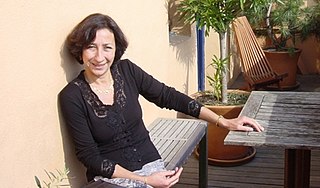
Margaret Rose Maruani Rey was a Tunisian-born French sociologist and director of research at the French National Centre for Scientific Research (CNRS) in Paris. She was the founder and editor-in-chief of the academic journal, Travail, Genre et Sociétés and directed the international and multidisciplinary research network "Marché du travail et Genre" (MAGE–CNRS).










